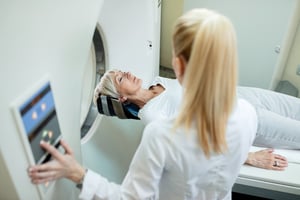 Organ function and structure can be examined through nuclear medicine. The imaging experts at Lane Regional Medical Center use nuclear medicine as a more capable level of radiology that can diagnose and treat abnormalities in their early stages. With a combined mix of disciplines that include mathematics, chemistry, medicine, physics, and technology, organ function and structure can be more accurately identified. The nuclear branch of radiology is commonly used to treat and diagnose abnormalities in the early stages of a disease or condition.
Organ function and structure can be examined through nuclear medicine. The imaging experts at Lane Regional Medical Center use nuclear medicine as a more capable level of radiology that can diagnose and treat abnormalities in their early stages. With a combined mix of disciplines that include mathematics, chemistry, medicine, physics, and technology, organ function and structure can be more accurately identified. The nuclear branch of radiology is commonly used to treat and diagnose abnormalities in the early stages of a disease or condition.
How Does Nuclear Medicine Work?
Nuclear medicine uses a small amount of radionuclide, a radioactive substance. This substance is also referred to as radioactive tracer or radiopharmaceutical and is absorbed by the body’s tissue to assist in the exam. There are a variety of different radionuclides that are implemented depending on the part of the body and the objective of the examination. These radiopharmaceuticals include xenon, gallium, iodine, technetium, and thallium.
What are the Benefits of Nuclear Medicine?
The advantage of nuclear medicine over other types of imaging tests like x-rays is that x-rays pass through soft tissue like blood vessels, muscles, the intestines, and other parts of the anatomy, making them hard to see on standard x-rays. Nuclear imaging allows the tissue and organ’s function and structure to be visualized. Measuring how the radionuclide reacts with the body allows your physician to diagnose and assess many conditions, developments, and health issues. This kind of imaging can identify infections, hematomas, tumors, cysts, and other organ problems.
What Types of Nuclear Medicine Scans are There?
There are many different types of nuclear medicine scans that can be applied for a variety of needs. Renal scans examine the kidneys and can identify any abnormalities like the obstruction of renal blood flow. Gallium scans can detect infectious diseases as well as inflammatory issues, abscesses, and tumors. Thyroid scans with nuclear imaging can evaluate thyroid function and discover any masses or nodules. For abnormal blood flow identification in the heart, heart scans are effective in determining damage in the heart’s muscles and evaluating overall heart function. Bone scans can identify changes and damage in the bones and joints from degenerative conditions like arthritis.
Nuclear medicine and imaging are a very effective way to discover, identify, and diagnose important health conditions. The experts at Lane Regional Medical Center’s imaging center are here for all of your imaging and radiology needs.




.png?width=110&height=110&name=lane%20badge%20(1).png)
